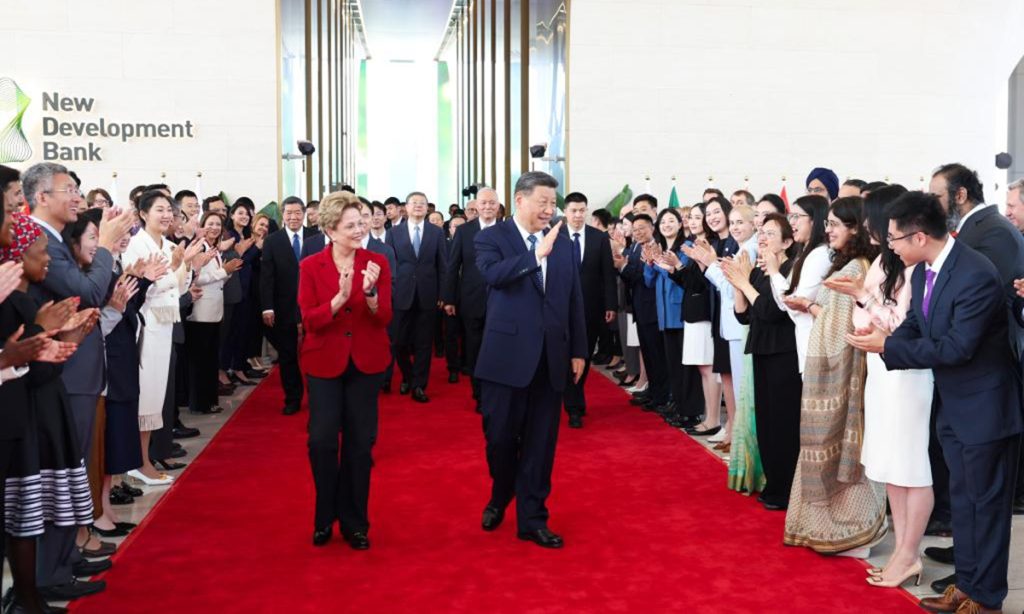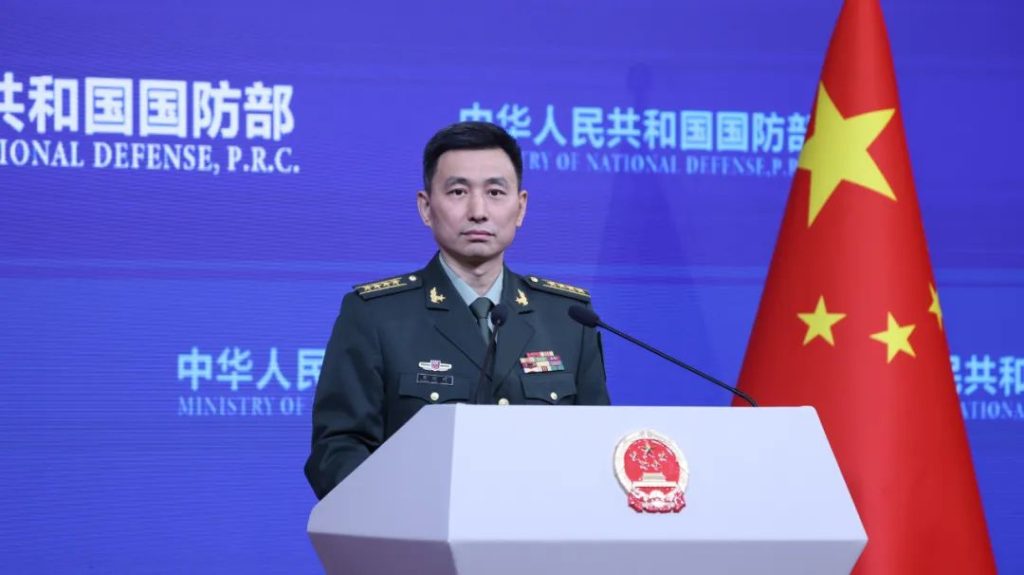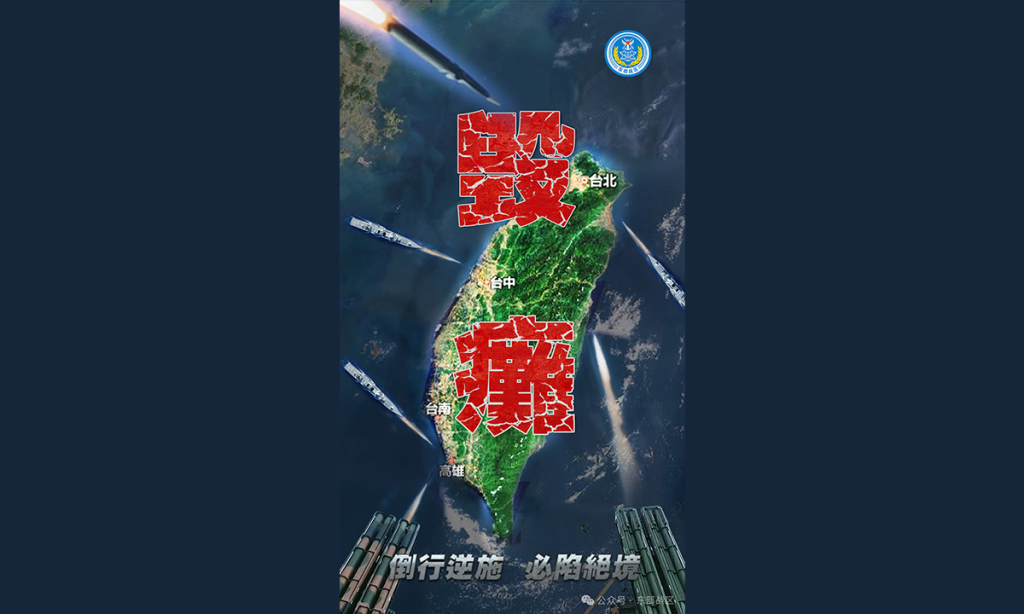Xi visits New Development Bank, hails broader BRICS cooperation for ‘entering a stage of high-quality development’

Chinese President Xi Jinping on Tuesday visited the New Development Bank (NDB) in Shanghai and met with Dilma Rousseff, president of the institution, the Xinhua News Agency reported.
Xi congratulated Rousseff on her reelection as president of the NDB, and noted that the bank is the world's first multilateral development institution established and led by emerging markets and developing countries. Xi called the bank "a pioneering initiative for the unity and self-improvement of the Global South," and said that it conforms to the historical trend of reforming and improving global governance.
Established in 2015, NDB is a multilateral development bank established by BRICS countries with the purpose of mobilizing resources for infrastructure and sustainable development projects in emerging markets and developing countries.
Xi stressed that broader BRICS cooperation has entered a stage of high-quality development, and that the bank is set to embark on its second golden decade of high-quality development. The Chinese leader called on the bank to consider the development needs of the Global South, and to provide more high-quality, low-cost and sustainable infrastructure financing, according to Xinhua.
The bank needs to improve its management and operations, implement more technology and green finance projects, and help developing countries bridge the digital divide and accelerate green and low-carbon transformation, Xi said.
In discussions on the reform of international financial architecture, the bank should amplify the voice of the Global South, safeguard the legitimate rights and interests of the Global South, and support the countries of the Global South in their pursuit of modernization, he said.
China is also willing to share its development experience through the bank with other member countries, and stands ready to provide more international public goods, Xi said.
Rousseff expressed her gratitude to China for its long-term strong support for the growth and expansion of the NDB, according to Xinhua.
Despite the volatile situation in today's world, the Chinese government has resolutely stood up for the interests of the Global South, supported multilateralism, defended international fairness and justice, and promoted the construction of a community with a shared future for all, setting an example for the international community, she added.
Li Haidong, a professor at China Foreign Affairs University, told the Global Times that NDB serves as a core mechanism for fostering unity among BRICS members and Global South countries on the economic and financial fronts.
By promoting a stronger and more resilient foundation of shared interests, the NDB plays a constructive role in nurturing a collective consciousness of a shared human destiny, inspiring meaningful actions to advance this vision, Li said.
The greater BRICS and Global South countries play a critical role in safeguarding the global multilateral free trade framework, Li added. "Their close coordination and collaboration generate strong unity and cohesion, effectively countering the protectionism, unilateralism, and hegemony of a certain country."
This cooperation provides a powerful guarantee for strengthening and sustaining the health and vitality of the current WTO-centered multilateral free trade mechanism, Li added.
For open, sustainable development
Noting that the Global South countries have risen collectively into an important force in maintaining world peace, promoting common development and improving global governance, Xi said no matter how the international situation changes, the general course of human development and progress will not alter, Xinhua reported.
China has achieved its development through self-reliance and hard work. It will firmly safeguard its own legitimate rights and interests, as well as the common interests of the international community, Xi noted.
Noting that unilateralism and protectionism have been eroding the authority of international law and undermining the stability of industrial and supply chains, Rousseff said the New Development Bank will remain true to its original aspiration, take active measures, and contribute to promoting the development of developing and emerging-market countries.
Ahead of the Chinese leader's NDB visit and sending a clear signal of strengthening the greater BRICS cooperation and safeguarding Global South's common interests, foreign ministers from the BRICS countries called for bolstering multilateralism and inclusiveness, and promoting the establishment of a more just and reasonable international order, as they met in Rio de Janeiro.
Chaired by the Brazilian Foreign Minister Mauro Vieira, the BRICS Foreign Ministers' Meeting convened its first-stage meeting on Monday local time. During the meeting, Viera said that the BRICS bloc of emerging economies is a paramount example of multilateralism. He said BRICS is not "against any bloc or any country," but instead in favor of unity and development for Global South countries, according to Xinhua.
During the meeting, Chinese Foreign Minister Wang Yi said that BRICS countries should take the lead as a positive force on the international stage to serve as a pillar of peace and development.
During the meeting, other participants expressed support for China's series of global initiatives, agreeing that BRICS countries should oppose power politics and double standards, safeguard the legitimate rights of BRICS members and common interests of the Global South, work toward building a more just and equitable international order, and promote open, inclusive and sustainable development, according to Xinhua.
Wang Youming, director of the Institute of Developing Countries at the China Institute of International Studies in Beijing, said that the BRICS Foreign Ministers Meeting — the first to be held after the inclusion of the bloc's new partner countries - comes at a pivotal moment as BRICS cooperation enters a new phase.
"It is evident that BRICS collaboration is evolving in a more comprehensive and multi-layered manner," Wang noted, adding that the meeting is expected to play a constructive role in strengthening Global South cooperation and improving global governance mechanisms, with 2025 marking the 80th anniversary of the founding of the United Nations.
The BRICS foreign ministers meeting came at a critical moment for economic recovery. The International Monetary Fund has recently slashed growth forecasts due to the impact of the US-launched global tariff war, according to the AFP.
During the BRICS foreign ministers meeting, Chinese Foreign Minister Wang Yi reaffirmed China's commitment to upholding multilateralism and multilateral trade rules.
Wang believes it is imperative to uphold multilateral trade rules. He urged BRICS countries to jointly oppose all forms of protectionism and firmly uphold the rules-based multilateral trading system with the WTO at its core, according to Xinhua.
The Chinese foreign minister criticized the US for pursuing unilateralism and prioritizing its own country, placing its own interests above international public interests. If one chooses to stay silent and compromise, it will only embolden the bullies to push further, Wang warned.
Citing Brazil's BRICS representative Mauricio Lyrio, the AFP reported that ministers are negotiating a declaration aimed at reaffirming the centrality and importance of the multilateral trading system.
More countries in the world are taking concrete actions and expressing a collective will to uphold the WTO-centered multilateral trading system and the principles of free trade, while pushing back against deglobalization and the arbitrary imposition of tariffs by a certain country, said Li Haidong.
According to the expert, China's positions stand firmly with the common interests of the vast majority of countries and align with the broader trend of constructing a more balanced international economic system. The BRICS stance of strengthening international coordination and cooperation serves as a powerful counterbalance to forces that weaponize tariffs and seek to undermine the established global trading order.

